The clue to a fertile garden is often adding compost, which is organic material that adds nutrients to the soil. Did you know that the clue to a warm greenhouse and even a warmer house can also lie in your compost?
Compost generates heat through microbial activity & metabolism, & can reach 104-140°F. Compost heat can be used for heating greenhouses & other buildings, usually via water-filled tubing in the compost. Compost heat is thus a form of renewable, eco-friendly heating.
If you have a compost heap or a compost bucket in your garden, don’t think it is only going to produce an organic compound to help your plants grow. Read on to find out how the heat that it will generate can be used as well.
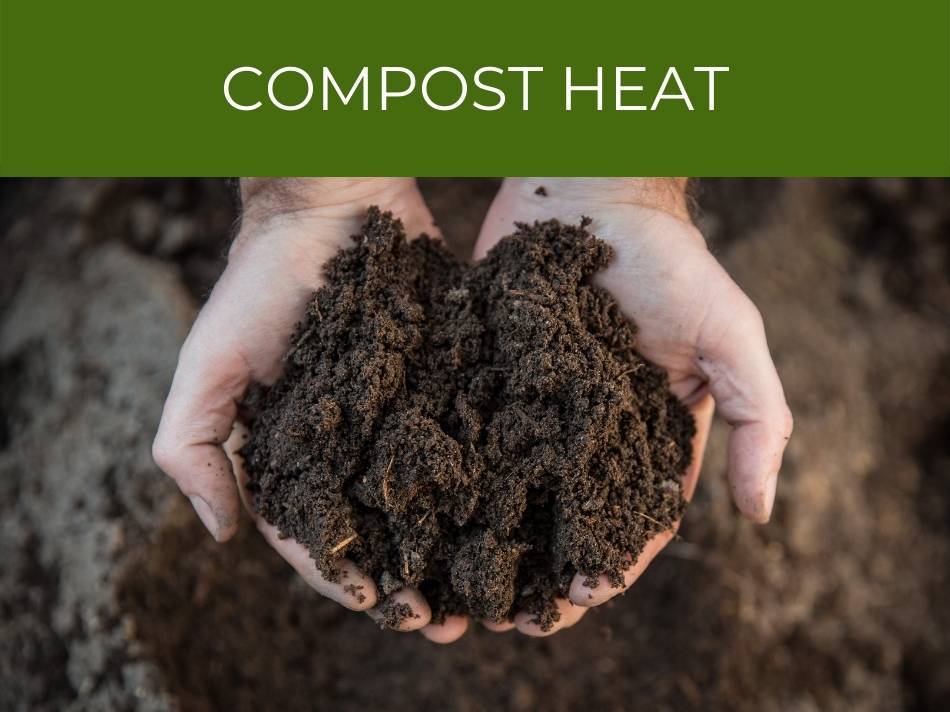
Compost heat
Composts need heat for the microorganisms to be activated, & they also generate heat from the microbial activity that works to decompose the organic material–usually 104-140°F. The heat from compost can be recovered as a source of eco-friendly, renewable heating energy–especially in greenhouses.
Compost is made up of organic materials and microorganisms, that work to decompose the material.
Microorganisms need heat to begin the process of decomposition of the organic material.
This microbial activity also produces heat itself.
This heat can be recovered to be used as a source of renewable energy for warming a greenhouse or a small building.
The heat from the compost is recovered by a compost heating system.
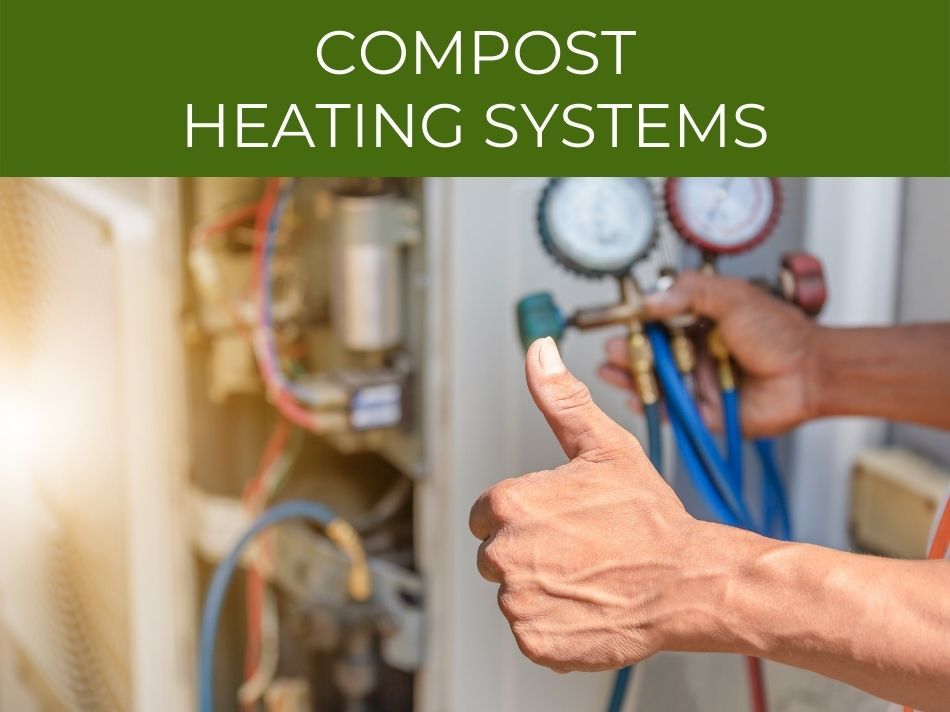
Compost heating systems
The activity of the microorganisms in compost generates heat of between 104-140°F, which can be used as the base for an eco-friendly heating system. The processes of compost heating systems differ, but most are based on heating water.
The heat generated by the process of decomposition in compost produces temperatures up to nearly 140 °F (60 °C).
If compost is carefully managed, it can be used to create a building system to heat a building.
Compost-based heating systems have varied from simple hotbeds to more sophisticated systems that conduct the heat.
The basis of a heating system like this is to heat water in pipes, which then heats the house.
An increased number of tunnels in the compost can increase the amount of heat the system produces.
A heating system can be made more efficient if heat exchangers are introduced into the compost.
The water that is heated is kept in a storage tank, which forms a packed heating tower.
The compost is at the bottom of the tower and the water at the top, so the heat rises and heats up the water.
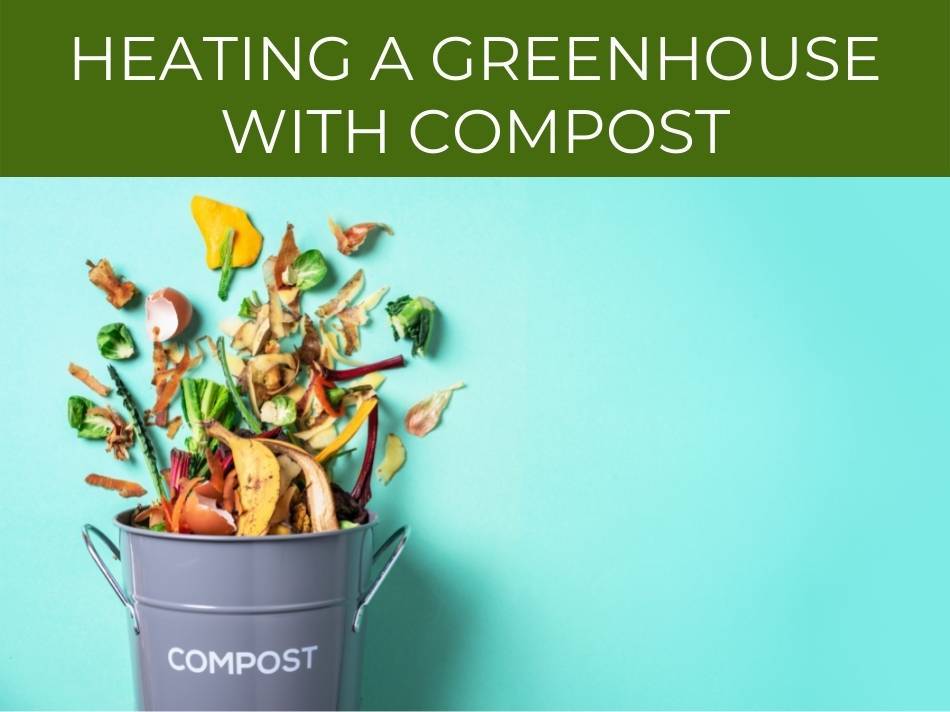
Heating a greenhouse with compost
The heat generated by the microbial action that decomposes the organic material in compost can be used to heat a greenhouse. Compost temperatures can be maximized by keeping moisture at 50-60% & making sure compost is in small pieces.
Domestic compost systems produce heat, because of the activity of the microorganisms decomposing the organic material.
The heat vapor from the compost can be used to heat a greenhouse using an air or water extraction system.
The compost should be made in closed bins that are placed around the greenhouse, which will easily raise the temperature to about 113 °F (45 °C).
An alternative is to support a planter box across two compost bins.
You can also use the equivalent of trench composting, by burying the organic materials in trenches between the rows of plants in the greenhouse.
The compost must be well-maintained, by turning it regularly, making sure the moisture content stays at about 50% and without adding any fresh organic material.
Check out our complete guide to heating a greenhouse without electricity.
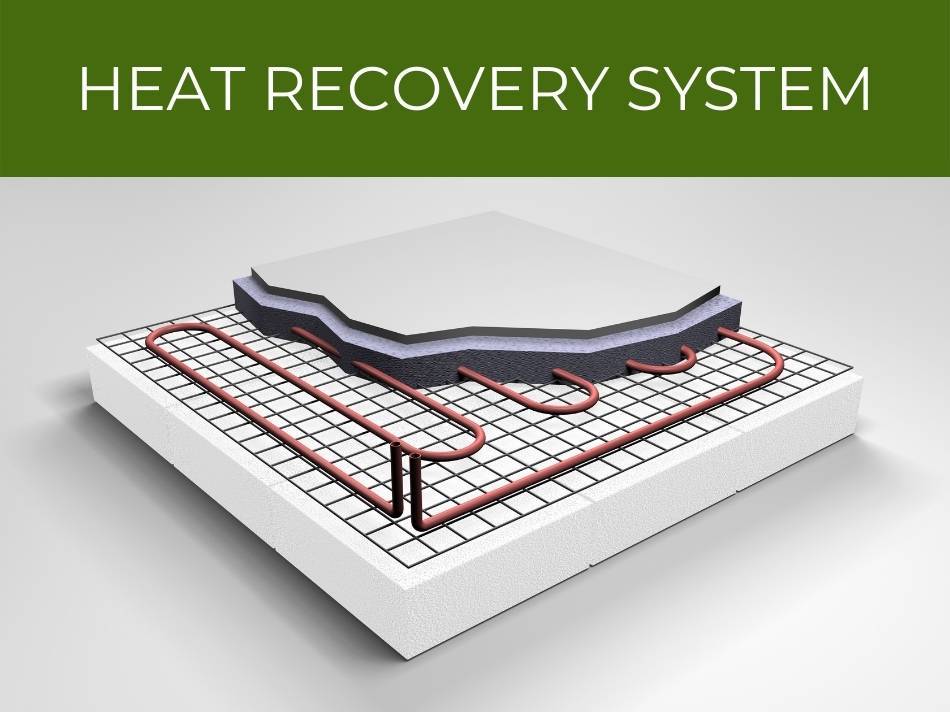
Heat recovery system
In order to capture the heat from compost, it is necessary to use a heat recovery system, which typically involves using coiled, water-filled tubing throughout the compost pile. The heated water in the tubing can then be pumped through large barrels or underfloor tubing.
The decomposition of organic matter in compost can produce temperatures up to 149 °F (65 °C), which can be recovered to heat homes and other buildings.
Some systems use heat vapor from the compost.
There are also designs that use both the hot air and the water droplets in the vapor that is generated.
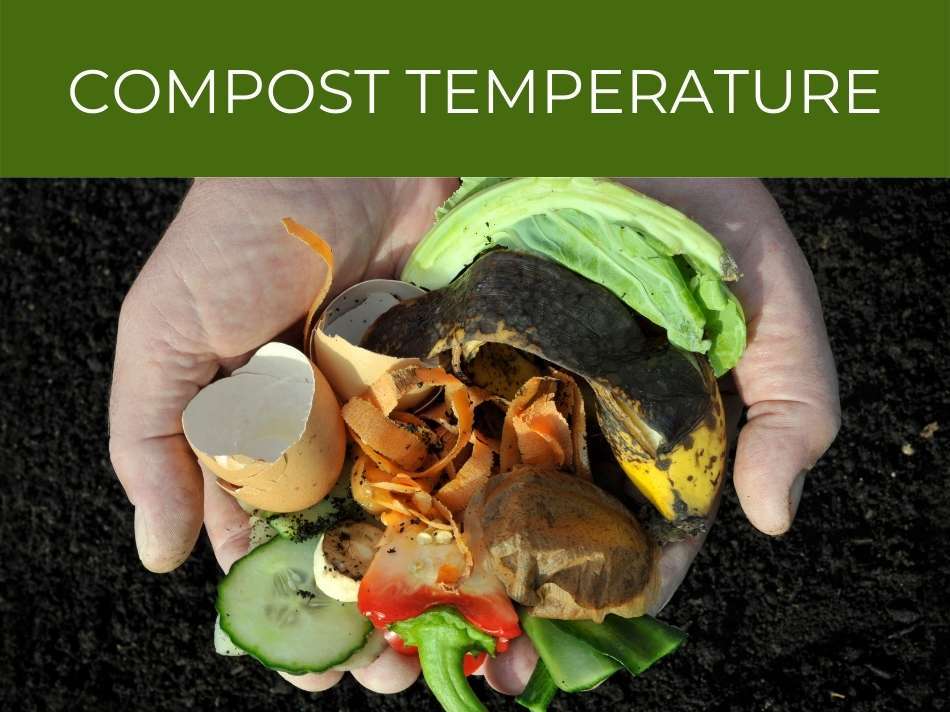
Compost temperature
The optimum temperature for compost is 130-150 °F (54-66 °C). If compost is prepared & maintained correctly, it can produce enough energy to heat water to about 117 °F (47 °C). Maximum compost temperatures require 50-60% water & small-size compost matter.
Temperature is one of the factors affecting the efficiency of the composting process.
For optimum functioning, compost should be kept at around 130-150 °F (54-66 °C).
This should ensure a very efficient process of composting, which can produce enough heat to raise the temperature outside the compost pile.
Don’t let the temperature of compost get too high, or the microorganisms can be killed.
In a closed tunnel system, compost can heat water up to about 117 °F (47 °C).
This temperature can be increased to more than 140 °F (60 °C), if some adaptations are made to the system.
The most effective way of doing this is to increase the number of tunnels in the compost and keep them in layers so that they are used simultaneously.
If your soil or compost smells weird, see our post about the causes & how to fix it.
How long does it take to compost?
The average time it takes compost to work is about 6 to 8 weeks. With specific treatment, compost can achieve an active temperature within 1 to 2 days. For a very rich compost and/or cooler outdoor temperatures, it may take up to a year to fully compost.
The process of composting depends on microbial activity, where the microorganisms in the compost act to decompose the organic material.
The average time for this to produce a viable compost is 6 to 8 weeks.
The time span can be longer, depending on how the compost is managed.
A compost that is kept in a barrel that can revolve can take a month to become useful.
It is important to make sure the compost has the right conditions.
The longer a compost pile is left to develop, the better the quality of the useful compost will be.
This can take up to a year.
If you’re considering using coffee grounds in the garden, check out our complete guide for coffee grounds in the garden.
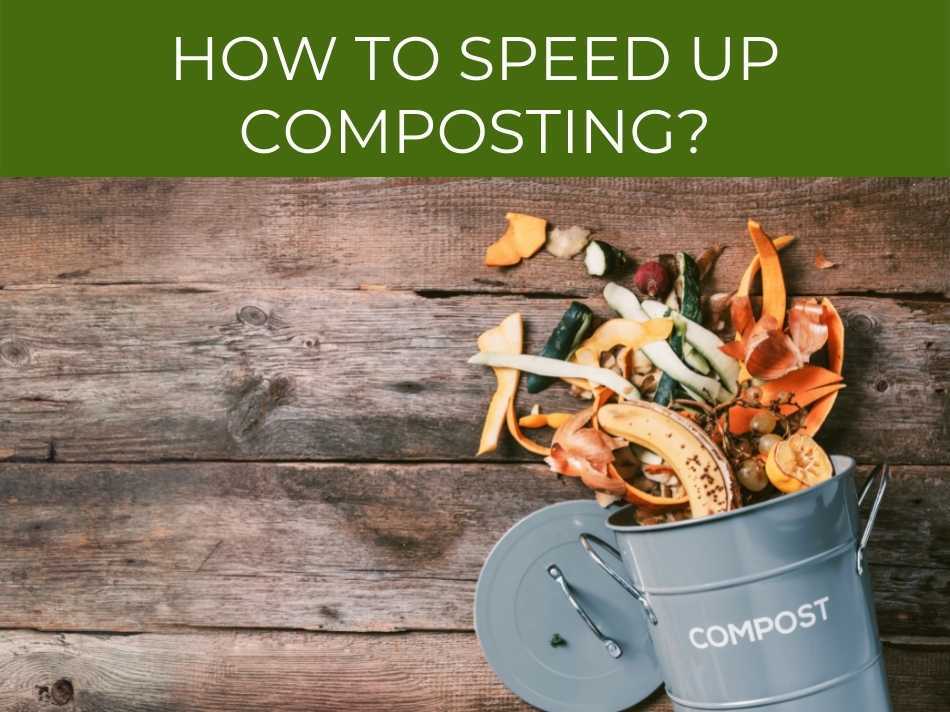
How to speed up composting?
Composting time can be shortened by maintaining 50-60% moisture content, using small-size compost matter, and by keeping a good balance between green and brown material. Higher outdoor temperature may also speed composting.
The trick to speeding up the process of composting is to achieve the optimum conditions and the condition of the compost.
This means keeping the temperature between 90 °F and 140 °F (32 °C and 60 °C).
You also need to make sure that there is a useful ratio between carbon and nitrogen, which means keeping a balance between green and brown material.
The amount of moisture in the compost needs to be about 50%.
Don’t add new organic material to the compost, as this will affect the efficiency of the process of decomposition.
You can add a bit of processed compost, which can introduce more microorganisms because more will mean the rate of decomposition will increase.
If the material that is used in compost is very small, then the surface area on which the microorganisms can act is larger.
This means that more activity can happen, which means the compost will achieve a higher temperature.
You do need to turn the compost regularly, to introduce air and move the microorganisms around.
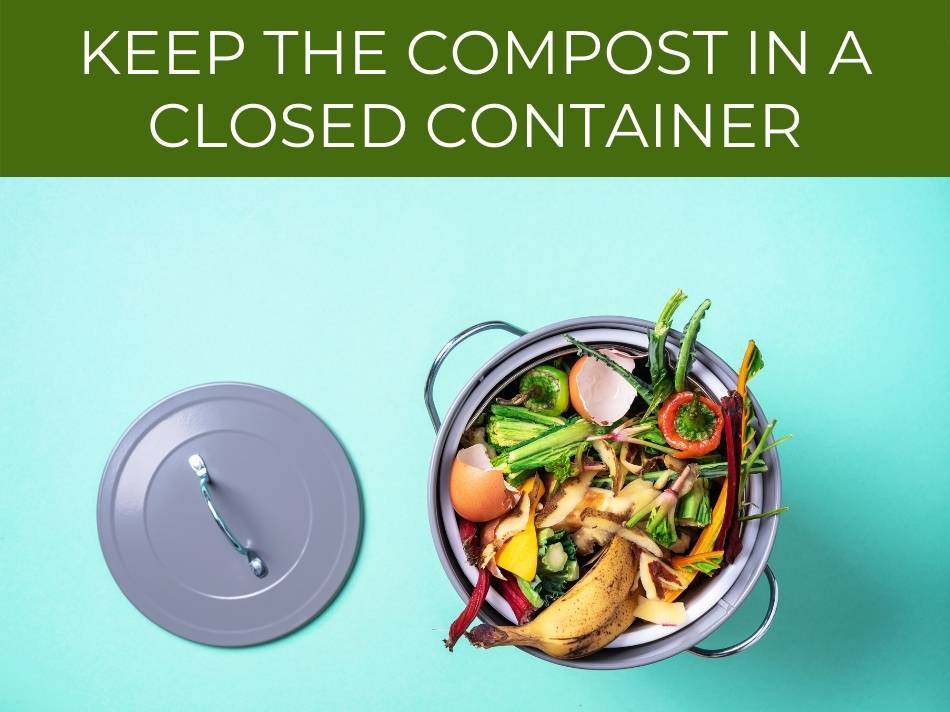
Keeping the compost in a closed container can help to speed up the process.
A bigger compost pile will create more microbial activity, which will produce more heat.
Check out the complete guide to making compost.

Conclusion
Compost heat refers to the temperature that activates the microorganisms to work on decomposing the organic material. It also refers to the heat generated by this activity. This makes compost heat integral to life in your garden in more than one way.

